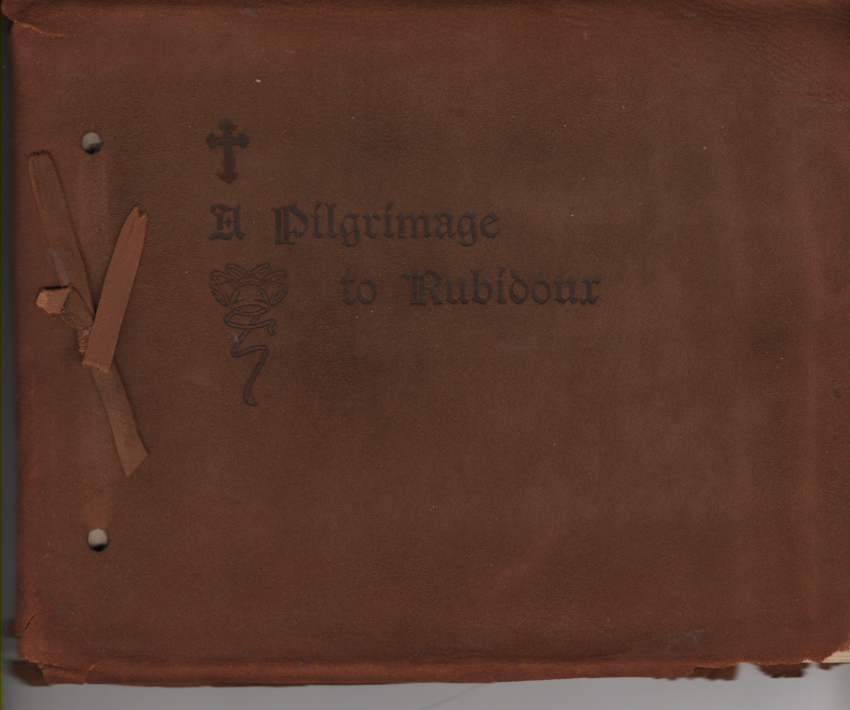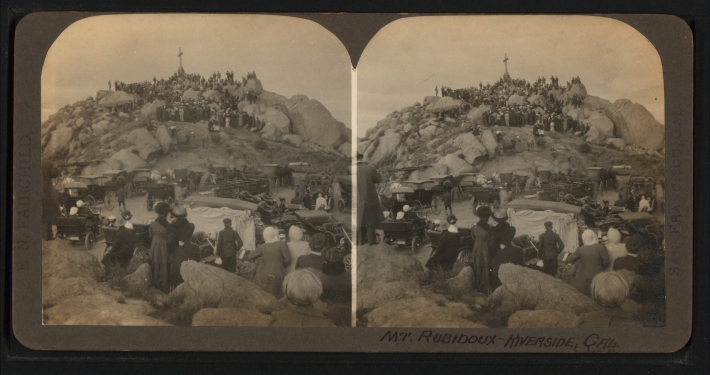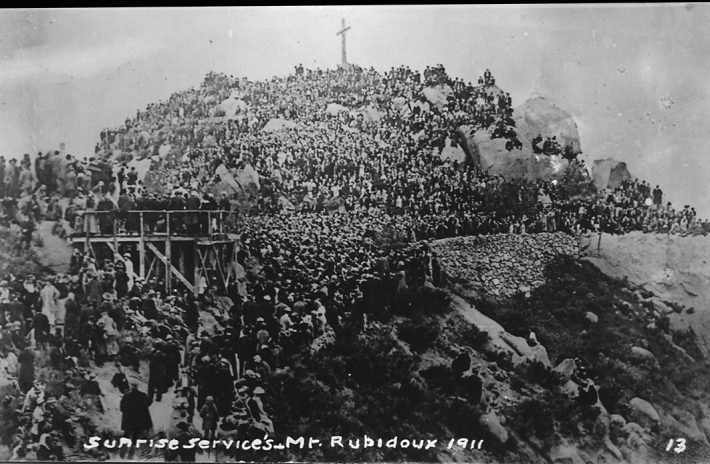16,000 Cardboard Spoons Highlight Child Hunger Crisis
La Sierra University art installation turns macaroni boxes into powerful statement on food insecurity.
A 113-year Riverside Easter tradition returns after COVID-19 hiatus

After two years of virtual services due to the COVID-19 pandemic, the Annual Easter Sunrise Service will return to the top of Mount Rubidoux at 6 a.m. Sunday. The organizers of the event, the Riverside Pastors Prayer Fellowship, advise attendees to allow 45 minutes to walk the 2.7-mile route to the mountain top. More information can be found at riversideeasterservice.com.
This historic event has been held on the mountain nearly every year since 1909. In 1924, the event was canceled due to a state-wide outbreak of hoof and mouth disease; still, approximately 200 people climbed the mountain to see the sunrise, then attended an Easter service at the Mission Inn. From 1943-1945, the service was suspended due to war restrictions. However, as in 1924, groups of people made the trek up the mountain for informal Easter services.
How did this special event, believed to be the oldest outdoor, non-denominational Easter sunrise service in the United States, come about? On February 22, 1907, Jacob Riis, a prominent social reformer and journalist who documented the conditions of New York City slums, was the invited speaker for the dedication of Huntington Drive, the newly-built road to the summit named after Henry Huntington, who helped fund much of the work done on the mountain. With a newly-installed American flag flying overhead, Riis, alluding to California’s Mission history, said, “The cross and the flag will tell their story, but unless we make it come true, they will tell it in vain” (Riverside Enterprise, February 23, 1907). Frank Miller seemingly took his words to heart: two months later, on April 26, 1907, Miller had a large wooden cross erected at the top of Mount Rubidoux. The cross became one of the most photographed sites for visitors to Riverside.
Riis was again a guest of Frank Miller’s on Palm Sunday in 1909. During this visit, Riis gave a speech in which he discussed making a pilgrimage to the top of the mountain he had visited two years before. The idea for an outdoor service on Mount Rubidoux was born.
That week, a committee was formed and plans were quickly made for an Easter sunrise service on Mount Rubidoux. The service was very simple. The assembly began with the singing of Samuel Francis Smith’s hymn, “The Morning Light Is Breaking.” Following a silent prayer, Gustav Hilverkus, band director at the high school, played a cornet solo of Stephen Adams’ hymn, “The Holy City.” Next, Frank Miller’s favorite hymn, “In the Cross of Christ I Glory,” written by John Bowring, was sung by the participants. The brief service closed with a recitation of the Lord’s Prayer.
The service was well received, and The Riverside Enterprise predicted: “It is sanguinely expected that today’s sunrise service will be so successful that its popularity will warrant annual repetition of the Easter morning services at the foot of the lofty cross” (Riverside Enterprise, April 11, 1909). It was estimated that over 200 people were in attendance.
Two years later, Riverside resident Elizabeth Anderson Freeman, who was present at the first service, wrote a poem commemorating the occasion. Freeman began gathering the names of other 1909 attendees, and included them with her poem, several pictures, and other details in a leather-covered booklet entitled, “A Pilgrimage to Rubidoux.” A paperback edition of the book can still be found in bookstores and internet outlets.

A photograph from that first 1909 Easter sunrise service is in the collection of the City of Riverside Main Central Library’s Local History Archives. The photo shows some of the participants, including Frank Miller (third from left) and his secretary, Marion Clark, whom he later married, to his left. Miller’s future son-in-law, DeWitt Hutchings, is shown in the middle wearing a dark suit and singing; Gustav Hilverkus is playing the cornet, and Allis Miller, Frank Miller’s only child and Hutchings’ future wife, is playing the small portable organ.
The second annual service on March 27, 1910, kept the simple format of the first, with some additions. “The Holy City,” was played by Gustav Hilverkus, followed by the group singing of “In the Cross of Christ I Glory.” Next was a silent prayer and a recitation of the Lord’s Prayer. Horace Porter, pastor of the First Congregational Church, led the participants in a responsive reading of Bible verses. The hymn, “O God of Wisdom and of Might” was sung. An account of the Resurrection, from Luke 24:1-6, was read by A.W. Adkinson, pastor of the First Methodist Church. This was followed by a newly composed hymn by Arthur Benton, the architect of the first two wings of the Mission Inn. Two solos, “Hosanna” and “Ava Maria” were sung by Mr. and Mrs. Harry Girard. The service ended with a choir singing the “Hallelujah Chorus” from Handel’s “Messiah,” under the direction of Professor E.D. Kech.

In the early years, the content of the service varied only slightly. Some elements became regular features, such as the singing of “In the Cross of Christ I Glory,” often to begin the service, and playing of the “The Holy City,” by Hilverkus on the cornet. Different local pastors were invited to participate. In 1911, DeWitt Hutchings, Miller’s son-in-law, read a poem entitled, “God of the Open Air,” by Dr. Henry Van Dyke of Princeton University. Over the next 36 years, DeWitt would read that poem 27 times.
Soon people were coming from other Southern California cities to join in the Easter celebration, and the Mission Inn was fully booked on the Saturday before the service. Special trolleys ran on Easter Sunday to bring attendees from the Inn to the base of Mount Rubidoux. By 1912, over 1500 people had participated in the Easter sunrise service.

Information on early Easter services gathered from “Anecdotes on Mount Rubidoux and Frank A. Miller, Her Promoter” by Glenn Wenzel
Let us email you Riverside's news and events every Sunday, Monday, Wednesday, and Friday morning. For free